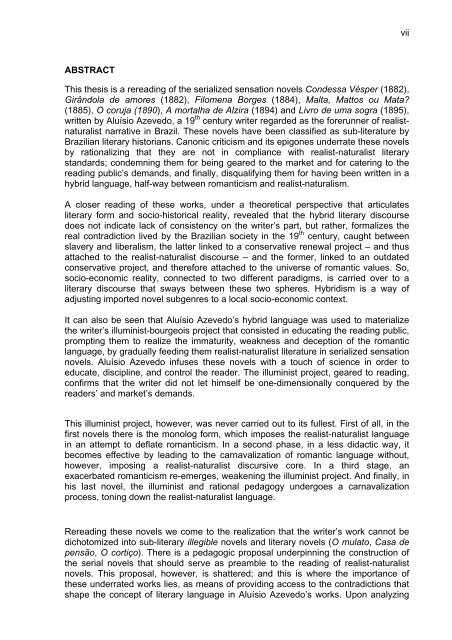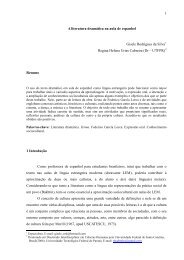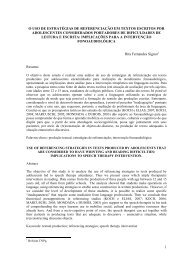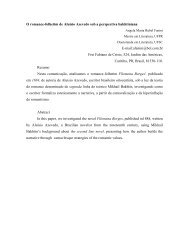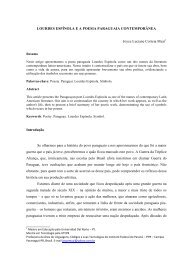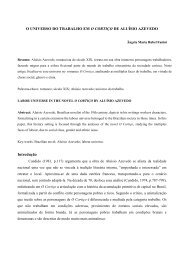- Page 1 and 2: UNIVERSIDADE FEDERAL DE SANTA CATAR
- Page 3 and 4: SUMÁRIO Dedicatória..............
- Page 5 and 6: A Marcelino Rubel e Priscila Rubel
- Page 7: Aluísio Azevedo como uma realidade
- Page 11 and 12: INTRODUÇÃO Não fecharei porém o
- Page 13 and 14: crítica contemporânea do escritor
- Page 15 and 16: sorte de expedientes literários ro
- Page 17 and 18: marcadamente metalingüístico, o q
- Page 19 and 20: conservadorismo e a modernidade ora
- Page 21 and 22: propósito porque, passando-se na I
- Page 23 and 24: entendendo-o como também instituin
- Page 25 and 26: Maranhão, o jornal anticlerical O
- Page 27 and 28: literária. Marlyse Meyer também r
- Page 29 and 30: estudos em teoria literária define
- Page 31 and 32: tanto a felicidade de Rastignac qua
- Page 33 and 34: Ainda sobre o romance-folhetim em B
- Page 35 and 36: atualidade: são impregnadas de pol
- Page 37 and 38: 4. O ROMANCE: UMA FORMA ÉTICO-POL
- Page 39 and 40: século XVII, ativada de modo espec
- Page 41 and 42: mesmo modo, Bakhtin assevera que
- Page 43 and 44: literária enobrecida e homogênea.
- Page 45 and 46: 5. O CARNAVAL E A CARNAVALIZAÇÃO
- Page 47 and 48: duplicidade, a alteridade, própria
- Page 49 and 50: analisá-la usando uma linguagem, m
- Page 51 and 52: 6. FORMAS IMPORTADAS: AJUSTES E DES
- Page 53 and 54: a uma visão cientificista dos fato
- Page 55 and 56: uma contradição interna, um confl
- Page 57 and 58: Alfredo Bosi, em A escravidão entr
- Page 59 and 60:
7. DISCURSOS CRÍTICOS EM TORNO DE
- Page 61 and 62:
Em todo o caso, foi ele [Alencar] o
- Page 63 and 64:
mais próximo do universo popular e
- Page 65 and 66:
internalizam na consciência do suj
- Page 67 and 68:
Lúcia Miguel-Pereira 84 salienta q
- Page 69 and 70:
Queirós. A conseqüência foi que
- Page 71 and 72:
Herman Lima, em artigo intitulado
- Page 73 and 74:
epresentativos da literatura brasil
- Page 75 and 76:
obras, cobrindo, sobretudo, o perí
- Page 77 and 78:
fazia, dentro dos limites dos meios
- Page 79 and 80:
compaixão e não desprezo. O conde
- Page 81 and 82:
Não hesitei, tomei da pena e escre
- Page 83 and 84:
quisermos determinar qual dos dois
- Page 85 and 86:
opção, mas por uma necessidade, p
- Page 87 and 88:
personagens cujo objeto de fala é
- Page 89 and 90:
amantes mais jovens e a se subordin
- Page 91 and 92:
A heroína repudia o “herói da m
- Page 93 and 94:
(Comendador Moscovo), por ter perdi
- Page 95 and 96:
outra alternativa para a economia.
- Page 97 and 98:
O narrador levanta situações hipo
- Page 99 and 100:
social. Aqui, a bondade e a virtude
- Page 101 and 102:
evelando o contexto sócio-econômi
- Page 103 and 104:
Condessa Vésper opera uma crítica
- Page 105 and 106:
várias peripécias amorosas de Gre
- Page 107 and 108:
que tais romances apresentam maior
- Page 109 and 110:
Gregório, protagonista, no início
- Page 111 and 112:
101 D. Januária gozava para o More
- Page 113 and 114:
evelando-se afetada, romântica, so
- Page 115 and 116:
105 O narrador, como vimos e veremo
- Page 117 and 118:
último folhetim, Livro de uma sogr
- Page 119 and 120:
109 Esses dois comendadores, na rea
- Page 121 and 122:
111 paraguaio. Aluísio Azevedo tra
- Page 123 and 124:
pois nele irrompem o incerto, o neb
- Page 125 and 126:
115 aquarela e da pintura a óleo.
- Page 127 and 128:
117 Girândola de amores, primeiram
- Page 129 and 130:
Christie, por exemplo. O projeto il
- Page 131 and 132:
das próprias práticas sociais oit
- Page 133 and 134:
todas as situações aventurescas p
- Page 135 and 136:
e frustrações no decorrer da narr
- Page 137 and 138:
aventuras as mais perigosas, vivend
- Page 139 and 140:
Monarca, passa a exercer no cotidia
- Page 141 and 142:
131 aventura e prestígio social de
- Page 143 and 144:
133 Entretanto, mesmo negando a cul
- Page 145 and 146:
135 casal se torna íntimo. O casal
- Page 147 and 148:
social dinâmico e conflituoso em v
- Page 149 and 150:
139 linguagem bem humorada, ficcion
- Page 151 and 152:
principalmente, o tom polêmico e o
- Page 153 and 154:
143 Aluísio Azevedo, ao introduzir
- Page 155 and 156:
145 do caso. Abre-se inquérito pol
- Page 157 and 158:
do jornal O Paiz. Essa personagem a
- Page 159 and 160:
já uma problematização sobre a v
- Page 161 and 162:
a fim de que se restabeleça uma or
- Page 163 and 164:
153 O meu amigo e informante gostav
- Page 165 and 166:
155 aproximando a obra do romance d
- Page 167 and 168:
ambigüidade, pois é um filósofo,
- Page 169 and 170:
filósofo, o contemplativo, aquele
- Page 171 and 172:
161 Nesses excertos detectamos uma
- Page 173 and 174:
163 linguagem, problematizar a filo
- Page 175 and 176:
ansioso, jamais termina um trabalho
- Page 177 and 178:
autoritarismo, mas não consegue se
- Page 179 and 180:
169 ilimitada os assemelha e é exe
- Page 181 and 182:
171 defeituoso, porque ele não é
- Page 183 and 184:
outros, do contraste com o outro. H
- Page 185 and 186:
175 febre do avô, a paixão da alt
- Page 187 and 188:
177 Como destacamos anteriormente,
- Page 189 and 190:
da personagem machadiana, Teobaldo
- Page 191 and 192:
exaurindo em trabalho a fim de sust
- Page 193 and 194:
consciente-discursivo. Nesse sentid
- Page 195 and 196:
185 imagem mais terrível da dor hu
- Page 197 and 198:
Aluísio Azevedo está escrevendo e
- Page 199 and 200:
disciplina, a normalização e o bo
- Page 201 and 202:
191 O impasse (substituição de La
- Page 203 and 204:
construir Angelo como um ser espiri
- Page 205 and 206:
escarnece de Angelo. Aqui a loucura
- Page 207 and 208:
naturalistas na fábula. Cobalt pre
- Page 209 and 210:
199 cadeira, o seu corpo, um canjir
- Page 211 and 212:
hoje. Em A mortalha de Alzira, esse
- Page 213 and 214:
Cobalt distancia o leitor do arreba
- Page 215 and 216:
205 fábulas, peripécias e toda so
- Page 217 and 218:
eceita da sogra. O discurso de Olí
- Page 219 and 220:
portanto, tem que ser medíocre e n
- Page 221 and 222:
211 O discurso de Olímpia, ao tent
- Page 223 and 224:
213 galgando precipícios e vencend
- Page 225 and 226:
215 A gravidez não é poupada e pa
- Page 227 and 228:
217 satisfação de Magalhães - es
- Page 229 and 230:
9. OS ROMANCES-FOLHETINS DE ALUÍSI
- Page 231 and 232:
221 estudioso das letras, pois é n
- Page 233 and 234:
223 O “hibridismo” da linguagem
- Page 235 and 236:
conservadoras, ora progressistas, o
- Page 237 and 238:
se constitui como uma escrita vincu
- Page 239 and 240:
aluisiana, pois, como vimos, a publ
- Page 241 and 242:
se o projeto de interação entre l
- Page 243 and 244:
arquitetura cômica, destrona o rom
- Page 245 and 246:
no tocante à fuga de perspectivas
- Page 247 and 248:
Essas obras não podem ser consider
- Page 249 and 250:
_____.O livro de uma sogra. 12. ed.
- Page 251 and 252:
241 EAGLETON, T. A ideologia e suas
- Page 253 and 254:
Produção: Lagoa Cultural e Esport
- Page 255 and 256:
SÜSSEKIND, F. As revistas de ano e
- Page 257 and 258:
ANEXO 1 O MULATO (Romance de Aluizi
- Page 259 and 260:
249 Na epocha que atravessamos, pro
- Page 261 and 262:
filho natural de seu marido, dava-l
- Page 263 and 264:
arrazoadamente, em uma causa tão c
- Page 265 and 266:
255 Assim á pagina 161, quando o
- Page 267 and 268:
ANEXO 2 O HOMEM Por Aluísio Azeved
- Page 269 and 270:
Corria o tempo e elles a se amarem
- Page 271 and 272:
ANEXO 3 GALERIA DO ELOGIO MUTUO 261
- Page 273 and 274:
263 consequencia logica de sua sinc
- Page 275 and 276:
ANEXO 4 CRÍTICA AO LIVRO DE UMA SO
- Page 277 and 278:
267 Cumpre-se, entretanto, o plano
- Page 279 and 280:
ANEXO 5 O LIVRO DE UMA SOGRA (impre
- Page 281 and 282:
271 E separam-se por falta de amor
- Page 283 and 284:
273 Devo confessar que entre o pess
- Page 285 and 286:
contrariedades e derrotas só podem
- Page 287 and 288:
277 Com o remedio, inventado por D.
- Page 289 and 290:
ANEXO 6 A OBRA DE ALUÍZIO AZEVEDO
- Page 291 and 292:
aspectos da antiga Corte. Assim, ap
- Page 293 and 294:
283 Neste romance, que tem todos os
- Page 295 and 296:
Humaine”, em caixa alta, reduziam
- Page 297 and 298:
ANEXO 7 UMA LÁGRIMA DE MULHER Prim
- Page 299 and 300:
289 romântico, ao “Livro de uma
- Page 301 and 302:
ANEXO 8 O HIBRIDISMO ESTÉTICO DE A
- Page 303 and 304:
que ele dê pela tramóia, porque a
- Page 305 and 306:
ANEXO 9 O CENTENÁRIO DE ALUÍZIO A
- Page 307 and 308:
ingênua Maria Duarte. Foi o seu pr
- Page 309 and 310:
“Se te sustenta impune o mundo qu
- Page 311 and 312:
crônica de Machado de Assis e na a
- Page 313 and 314:
303 A essa tirada, acrescenta Aluí
- Page 315 and 316:
305 Esses livros estão para a obra
- Page 317 and 318:
e os tipos que pretendia apresentar
- Page 319 and 320:
nosso afeto, - e que em artigo publ
- Page 321 and 322:
311 “Desferiram-se navalhas contr
- Page 323 and 324:
ao irmão, Arthur. Em primeiro luga
- Page 325 and 326:
líquido, arremeteu contra o barco
- Page 327 and 328:
ANEXO 10 ALGUNS ASPECTOS DE ALUÍSI
- Page 329 and 330:
os grandes do seu tempo, um Manet d
- Page 331 and 332:
321 provocando uns o carinho, outro
- Page 333 and 334:
autobiográfica. Além disso, no tr
- Page 335 and 336:
vermelho, de onde lhe vinha a alcun
- Page 337 and 338:
Chagas, muito da sua afeição juve
- Page 339 and 340:
329 É assim, por exemplo, que êle
- Page 341 and 342:
331 misto igualmente de D. Quixote,
- Page 343 and 344:
333 Para Lúcia Miguel Pereira, as
- Page 345 and 346:
omancistas, que êle abandonara, e
- Page 347 and 348:
conseguinte depois da publicação
- Page 349 and 350:
339 o que me emudece. Não, é a vi


